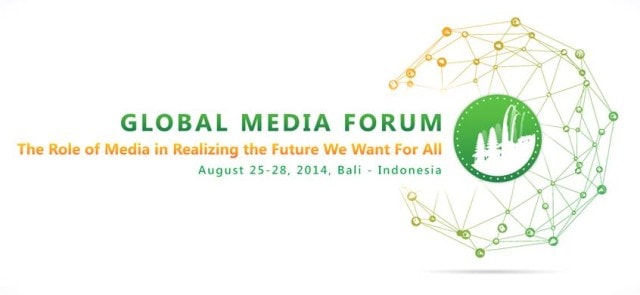On 28 August 2014, the Global Media Forum adopted the UNESCO-initiated Bali Roadmap recommending principles and actions to be considered in charting the future direction of media in the context of sustainable development. Titled the ‘Bali Road Map: The Roles of the Media in Realizing the Future We Want for All’, the document emphasizes the […]
On 28 August 2014, the Global Media Forum adopted the UNESCO-initiated Bali Roadmap recommending principles and actions to be considered in charting the future direction of media in the context of sustainable development.
Titled the ‘Bali Road Map: The Roles of the Media in Realizing the Future We Want for All’, the document emphasizes the “importance of including a goal on freedom of expression and independent media in the post-2015 Sustainable Development Goals and of including this recognition in development practice more broadly.”
UNESCO Freedom of Expression and Media Development Division Director Guy Berger said while the roadmap is not a binding document, it can be used by all as a reference to possible directions in promoting the role of the media in future development goals.
“The map reflects the agenda of our deliberations and points forward for progress,” he said at the closing of the forum on 28 August.
The road map details actions to key stakeholders, namely governments, media outlets, media professionals, users, UNESCO and the international community.
The road map calls on governments to review legal restrictions including criminal defamation laws on media content or structures; systematically collect and make accessible to the public, information related to development while protecting privacy, and make concerted efforts to ensure that those involved in production of journalism can work without fear or risk of attack.
Media outlets and professionals should promote respect for the highest professional and ethical standards in journalism, promote gender-sensitive policies and strategies to foster the participation of women and marginalized groups in all levels of media, and strive for appropriate time and resources for investigative reporting.
For the international community, the road map recommends that aid programmes take into account the importance of freedom of expression issues in all development efforts and where relevant, promote the safety of journalists.
Yanuar Nugroho, the Director and Special Advisor to a special government oversight and delivery unit in Indonesia, and who was involved in the negotiations on the proposal for the post-2015 Sustainable Development Goals, said the focus on media was diluted from the early draft to the one in use at the UN Working Group.
Leaders of Infonesia, Liberia and the UK co-chaired the High-Level Panel of Eminent Persons (HLP) on the Post-2015 Development Agenda, which submitted their proposals to the UN Working Group.
“In the SDGs, the importance of media is only implied in one target, i.e. Goal 16, while the word ‘media’ appears around 20 times and the earlier draft Goal 10 explicitly mentions the rights of people to enjoy freedom of speech, association, peaceful protest, and access to independent media and information.”
More than 200 media and free expression groups had issued a joint call to the HLP to ensure inclusion of freedom of expression and freedom of association. The civil society initiative, the Paris Declaration, was adopted during the 2014 World Press Freedom Day.
The three-day forum, hosted jointly by UNESCO and the Indonesian Ministry of Communication and Information Technologies, was organized to contribute to the ongoing international debate about the importance of media and ICT for peace and sustainable development.
Among the themes addressed at the forum were freedom of expression and human and social development, media literacy and the empowerment of marginalized groups, facilitating good governance through media, role of media in promoting peace and dialogue, gender equality and media, safety of journalists and ethics and professional standards.



